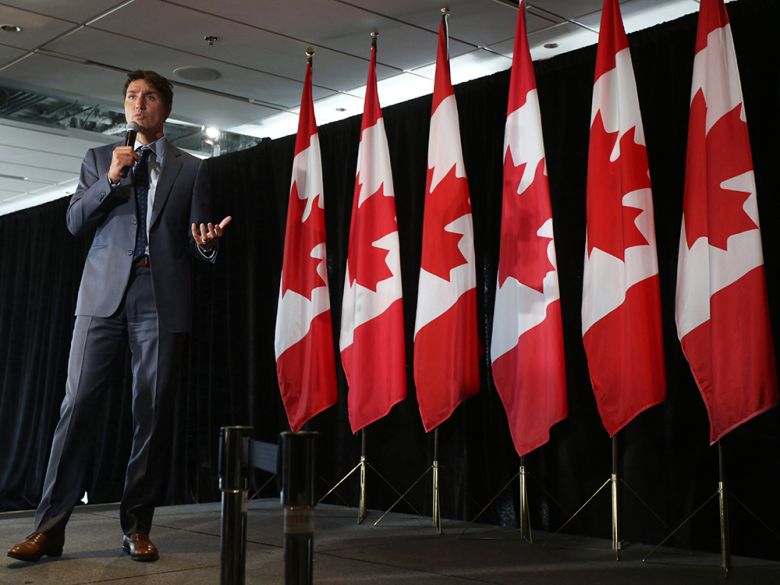Prime Minister Justin Trudeau is a big believer in the advice of foreign experts.
In the months after the 2015 election Liberals were addressed on several occasions by Sir Michael Barber, a British expert of “deliverology,” who advised on ways to keep the avalanche of promises they’d made. Later they heard from David Axelrod, a key strategist for former president Barack Obama, who was invited to “motivate and inspire and focus” party members mulling a platform for re-election.
Most recently sage counsel was offered by Tim Dixon, co-founder of a U.K.-based organization established to push positivity. More in Common aims to “build communities and societies that are stronger, more united and more resilient to the increasing threats of polarization and social division.” Kind of a British version of Sunny Ways Inc.
Dixon recommended Liberals “bring the focus back to the majority” as they set out in search of re-election in October, emphasizing shared values across the broad spectrum of everyday Canadians rather than focusing on the “us versus them” of marginalized groups and minority interests. The message was intended to help prevent Canada succumbing to the uglier aspects of populism as seen in parts of Europe and the United States.
It’s debatable whether Trudeau’s is a government able to grasp the lesson
It’s a reasonable enough message — how many people out there prefer confrontation and division over shared interests and common values? But it’s debatable whether Trudeau’s is a government able to grasp the lesson, given its habit of promoting its views by disparaging those who disagree.
It may seem odd that a party that sees itself as the soul of Canada and bedrock of unity would need to be told to quit playing one group against another, but the very essence of the government’s approach has been to reject the validity of opinions different from its own, and those who hold them. As John Ivison, author of a newly published book on Trudeau, observes: people who fail to share the prime minister’s vision “are dismissed as uninformed, irresponsible or motivated by unworthy purposes.”
The debate about climate change is an example: Canadians who may have valid concerns about the most effective means of fighting its impact are treated as cranks, deniers or stooges of big business. When Environment Minister Catherine McKenna heard that Conservative Leader Andrew Scheer had met with energy industry executives — a normal enough task for a national party leader — she immediately, and with no real idea what had been discussed, denounced it as “scheming behind closed doors with wealthy executives to gut environmental protection laws, silence critics, and make pollution free again.” As if working for Suncor, Syncrude or TC Pipelines instantly transforms ordinary working people into greedy plutocrats.

In 2018 the government sought to deny summer jobs to students working for any organization that refused to sign on to an abortion rights pledge. When a flood of migrants poured into Canada illegally via a Quebec border crossing, Liberals initially treated those calling for action as bigots and extremists before reversing field and introducing tougher measures on asylum seekers. Before resigning as Trudeau’s principal secretary, Gerald Butts was noted for his acerbic Twitter attacks on the media, political opponents, analysts and anyone who questioned Liberal deeds, once dismissing jokes about Trudeau’s use of the term “peoplekind” as the work of Nazis.
Butts recently returned to assist in the Liberal re-election bid, which has already demonstrated a preference for attacking Ontario Premier Doug Ford rather than discussing the Liberal record. In a recent speech to Liberal candidates in Ottawa, the prime minister managed the delicate political feat of smearing Conservatives while professing to renounce smear tactics: “They throw mud at their opponents and hope we join them in the gutter and when we refuse to stoop to their level, they label us as naive,” he said.
This is not a government that demonstrates a facility for bringing people together
In short, this is not a government that demonstrates a facility for bringing people together. Nor is it one inclined to engage in serious debate over its policies, preferring to shut down Parliamentary inquiries or invoke cabinet confidentiality to thwart questioners, while burying contentious legislation in mass omnibus bills, which, by the way, it had pledged not to do.
That Canadians perceive the divisive nature of Trudeau Liberalism is evidenced by the Liberals’ decline in the polls, which show them struggling to keep pace with Conservatives despite a reasonable economy, low unemployment and billions of dollars in government largesse to hand out. It’s evident by the contraction in Liberal premiers across the country, and the sudden revival of talk of separatism in Alberta.

The prime minister’s reduced popularity relates directly to the view he apologizes too often, is too politically correct, caters too much to activists and interest groups with narrow agendas, and immerses himself in an array of minority concerns which, while worthy enough, affect only a limited percentage of the population while the majority of Canadians feel their mundane worries about health care, family budgets, jobs and their children get secondary treatment.
It’s unfortunate that it would take a foreign expert to apprise the prime minister of this situation, but if that’s what it takes to remind Trudeau that “social division” comes from pitting favoured communities over the mundane masses, then Dixon will have served his purpose.






























